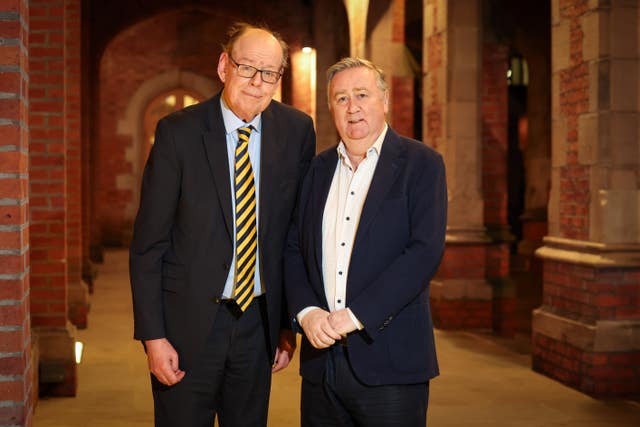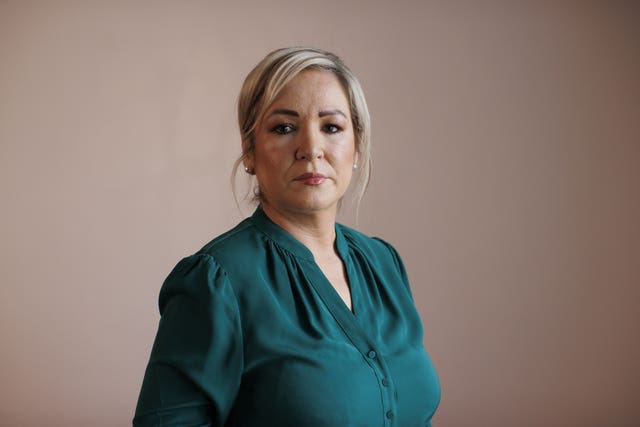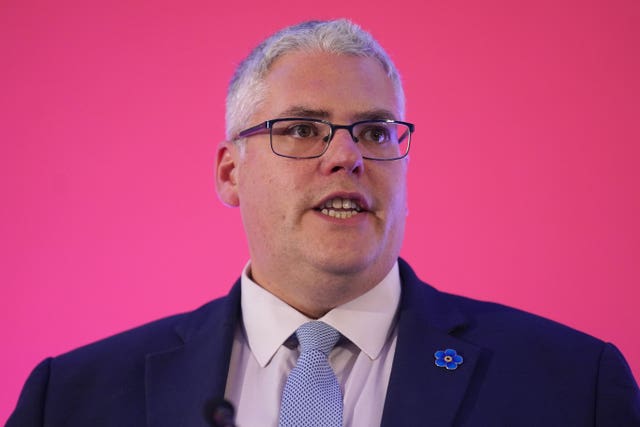Veteran Northern Ireland journalist Ken Reid has died at the age of 69 after an illness, his family has announced.
Mr Reid was best known as the long-time political editor of UTV, where he reported on many of the worst atrocities of the Troubles before chronicling the peace process.
Northern Ireland’s First Minister Michelle O’Neill led the tributes to Mr Reid, describing him as a “true giant in local journalism”.
Taoiseach Simon Harris also expressed his sadness at the passing of the veteran journalist.
ITV director of news Michael Jermey described him as “a towering figure in broadcasting in Northern Ireland”.
Mr Reid had previously spoken publicly about his battle with leukaemia and received well wishes from former prime minister Tony Blair among others.
He was married to Liz and was father to three children – Gareth, Sarah and Sophie – and a grandfather.
Mr Reid’s career in journalism began in 1977 at the News Letter and he was later sports editor and editor at the Sunday News.
He then worked for the Cork Examiner before joining UTV in 1994, where he held a number of senior editorial positions over 27 years before his retirement.
During his time as political editor he interviewed seven prime ministers and well as US presidents Bill Clinton and Barack Obama.
Mr Jermey said: “Ken was a towering figure in broadcasting in Northern Ireland.
“He will be enormously missed by colleagues in UTV and right across the wider ITV.”
He added: “Ken was a wonderful journalist. Well informed, intelligent and always utterly impartial in his approach to reporting.
“He had a ringside seat at some of the most significant moments of modern history – perhaps most notably the signing of the Good Friday Agreement.

“Ken was supremely well informed and he shared his deep knowledge with UTV viewers across three remarkable decades.
“He was hugely respected right across the television industry. I will miss him enormously and everyone at UTV and ITV send their sincere condolences to his widow, Liz, his children and his family and friends.”
Chris Hagan, editor of news at UTV, said: “Ken was the master of his craft. A brilliant role model who set standards.
“People said when prime ministers talked and they talked about Northern Ireland, they talked to Ken.
“He had the true inside track. It made him probably the most trusted journalist in Northern Ireland.
“People tuned in because they trusted him.”

Ms O’Neill said: “Ken was an award-winning journalist who was incredibly dedicated to his work, having covered some of the most historic moments in our politics.
“His strength and courage in the face of illness served as an inspiration to many, as he became a powerful advocate for raising awareness of cancer.
“We mourn the loss of a dear friend, and a remarkable man.”
DUP leader Gavin Robinson described Mr Reid as a “colossus is his field”.
He added: “Ken was a special journalist in Northern Ireland as someone who managed to get to the heart of all the major political stories and cover the difficult issues whilst retaining the respect, admiration and affection of representatives from all political opinions.
“He had contacts locally and nationally built up over many, many years and his passing will be deeply felt by many of us.”
Taoiseach Simon Harris said it was with the “utmost sadness” that he learned of Mr Reid’s death.
“Ken Reid was a giant of journalism and broadcasting in Northern Ireland at key moments for 30 years during the peace process,” he said.
It is with the utmost sadness that I have learned of the death of veteran journalist and former UTV political editor Ken Reid.
Ken Reid was a giant of journalism and broadcasting in Northern Ireland at key moments for 30-years during the peace process. May he rest in peace
— Simon Harris TD (@SimonHarrisTD) November 20, 2024
“He had a front row seat for all the main events and shared his insight with great clarity and expertise to a generation of viewers across Northern Ireland, Ireland and Britain.
“Off air he was an interesting and well informed gentleman who didn’t need to dominate the limelight.
“To his family, friends and many colleagues, I am sorry for your loss. May he rest in peace.”
Stormont Assembly Speaker Edwin Poots said Mr Reid was “held in the highest regard by the parties across the Assembly, and importantly the viewers, as a trusted and informed voice”.
“At a personal level, he never broke my trust. That is a universal position of colleagues across the political spectrum,” he said.
“That’s what made him such a giant of journalism and the man who broke the big stories.
“On behalf of the Assembly, we send our condolences to his family at this time.”
Northern Ireland’s Health Minister Mike Nesbitt, who worked with Mr Reid at UTV, said “it is hard to put into words the sadness felt today by all of us who knew Ken”.

He added: “I will remember him not just as a friend and a long-standing colleague, but as one of the best journalists Northern Ireland has ever produced.”
SDLP leader Claire Hanna said: “From the darkest days of the Troubles to the Good Friday Agreement and the early years of the peace settlement, he was a reassuring figure, who offered keen analysis with a comforting wit and easy charm, though he suffered no fools.”
TUV leader Jim Allister also expressed his sadness.
“Ken’s achievements in journalism will live on after him,” he said.
“The tenacity with which he pursued a story was matched only by the strength and dignity with which he fought his illness.
“He will long be remembered fondly not just locally but much further afield.”
Mr Reid was originally from Belfast, but his adopted hometown was Ballymena. He supported Cliftonville and Everton at football and Ballymena Rugby Club.
Earlier this year, he was honoured with the Chancellor’s Medal for services to journalism, along with former BBC political editor, Stephen Grimason.
Mr Grimason died in April.
Speaking to the PA news agency about his career earlier this year, Mr Reid said: “You don’t make progress in Northern Ireland unless you take risks – that’s the lesson (of the peace process).”
He recalled covering atrocities including an IRA bomb attack at Narrow Water in Co Down in 1979 when 18 soldiers were killed.
“I remember leaving there and smelling the stench of death, and then the sectarian murders, we experienced that, but then we had the delight of experiencing a political process which turned into a peace process and the development of the Good Friday Agreement.”
A statement from Queen’s University said: “Not only was Ken one of our greatest and most respected political correspondents, more importantly he was a man of compassion, modesty and fundamental decency, an outstanding human being.
“In the rough and tumble world of politics, in which relationships between elected representatives and the journalists tasked with holding them to account can often be fractious, Ken was held in the highest regard by political parties on all sides, by his professional colleagues and by the wider public.”





Why are you making commenting on The Herald only available to subscribers?
It should have been a safe space for informed debate, somewhere for readers to discuss issues around the biggest stories of the day, but all too often the below the line comments on most websites have become bogged down by off-topic discussions and abuse.
heraldscotland.com is tackling this problem by allowing only subscribers to comment.
We are doing this to improve the experience for our loyal readers and we believe it will reduce the ability of trolls and troublemakers, who occasionally find their way onto our site, to abuse our journalists and readers. We also hope it will help the comments section fulfil its promise as a part of Scotland's conversation with itself.
We are lucky at The Herald. We are read by an informed, educated readership who can add their knowledge and insights to our stories.
That is invaluable.
We are making the subscriber-only change to support our valued readers, who tell us they don't want the site cluttered up with irrelevant comments, untruths and abuse.
In the past, the journalist’s job was to collect and distribute information to the audience. Technology means that readers can shape a discussion. We look forward to hearing from you on heraldscotland.com
Comments & Moderation
Readers’ comments: You are personally liable for the content of any comments you upload to this website, so please act responsibly. We do not pre-moderate or monitor readers’ comments appearing on our websites, but we do post-moderate in response to complaints we receive or otherwise when a potential problem comes to our attention. You can make a complaint by using the ‘report this post’ link . We may then apply our discretion under the user terms to amend or delete comments.
Post moderation is undertaken full-time 9am-6pm on weekdays, and on a part-time basis outwith those hours.
Read the rules here